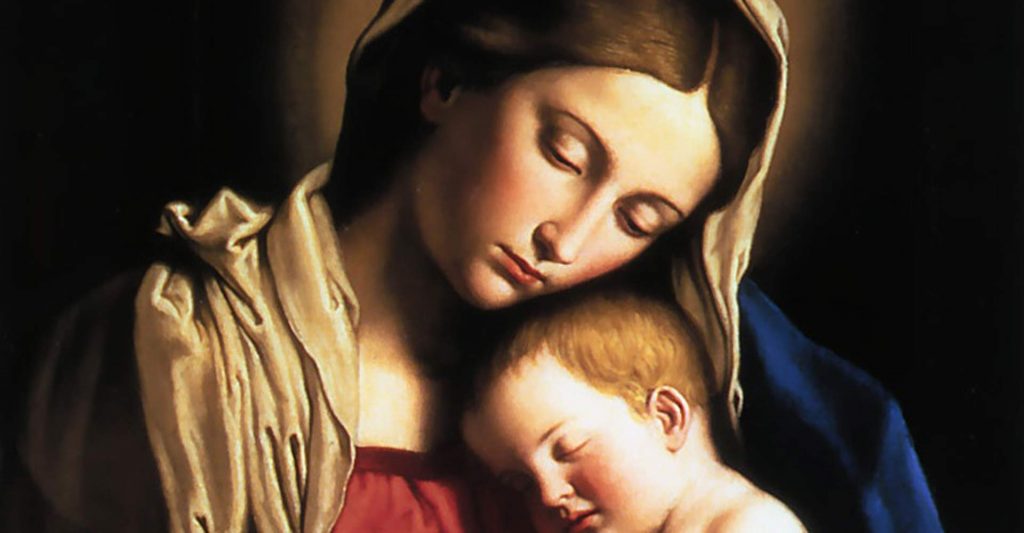
Why is the Solemnity of The Blessed Virgin Mary, the Mother of God, important—essential even—for Christians?
By Deacon Frederick Bartels
1 January 2025
The Church confesses: “What the Catholic faith believes about Mary is based on what it believes about Christ, and what it teaches about Mary illumines in turn its faith in Christ” (CCC 487).
Today on this solemnity of the Blessed Virgin Mary, the Mother of God, we recall that the Son of God became incarnate in the womb of the Virgin Mary, conceived by the power of the Holy Spirit, and was born of the Virgin womb in the village of Bethlehem. The Virgin’s child is given the name Jesus, which means “God saves.”
At the Council of Ephesus in 431, which condemned the heresiarch Nestorius, the Church bestowed the highest title upon Mary. She is declared to be Theotokos, a Greek word meaning “God-bearer,” or “Mother of God.”
Why was Nestorius’s errors condemned? He believed Christ to be a human person that was somehow joined to the divine person of the Son of God. Consequently, he insisted that Mary be given the title Christotokos, meaning “Christ-bearer,” in rejection of the title Theotokos. For Nestorius, Theotokos was saying too much.
At first glance, the title Christotokos might seem to be entirely unproblematic. However, it gave credence to Nestorius’s heretical position.
If Mary gave birth to a human person who was merely joined to the divine person of the Son, then what we have is two persons. In essence, the Nestorian heresy fractured Christ into two persons—a human one and divine one. All of that begs the question: “Who or what died on the cross?” Did a human person offer himself on the cross? If that is the case, then the Church’s doctrine of salvation in Christ is jeopardized. For it is impossible for a human person to redeem mankind from sin.
The doctrine of salvation in Christ and his death on the cross in expiation of sin is based on the fact that the divine person of the Son of God in the flesh offered himself up to death in perfect obedience to the will of his heavenly Father. Christ’s death is a redeeming event precisely because his humanity, united to his divine Person, is the instrument of our salvation. As is often said, the Son cannot save what he did not assume.
The Church teaches that the Son of God, in becoming incarnate in the Virgin Mary’s womb, assumed an individual human nature to his divine person. The incarnate Son of God—Jesus Christ—is not a human person fused to a divine person. He is a divine person who assumed an individual human nature to himself. Therefore we do not say that Christ is a human person. We say that he is the God-man. He is God in the flesh. Whatever he said or did during his earthly ministry, were the words and deeds of God made man—true God and true man.
Therefore it is easy to see why Mary’s title as Mother of God is so important. For if we restrict Mary’s maternity to Christotokos only, it negatively effects our belief and faith in Christ. Said another way, if we get Mary wrong, we too get Christ wrong. The Nestorian heresy clearly shows that to be the case. Hence the Church, as always, acts as guardian of the divine and Christian faith. The Church is mother and teacher, who tirelessly works to ensure that her children confess the true Christian faith.
Mary conceived in her womb and gave birth to the incarnate Son of God. As with any mother, she did not merely conceive and give birth to a human nature, but to a person. That person is the Second Person of the Holy Trinity in the flesh.
Sweet Virgin Mary, Mother of God, pray for us.

Deacon Frederick Bartels is a member of the Catholic clergy who serves the Church in the diocese of Pueblo. He holds an MA in Theology and Educational Ministry, and is a Catholic educator, public speaker, and evangelist who strives to infuse culture with the saving principles of the gospel. For more, visit YouTube, iTunes and Twitter.
Leave a Reply